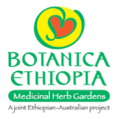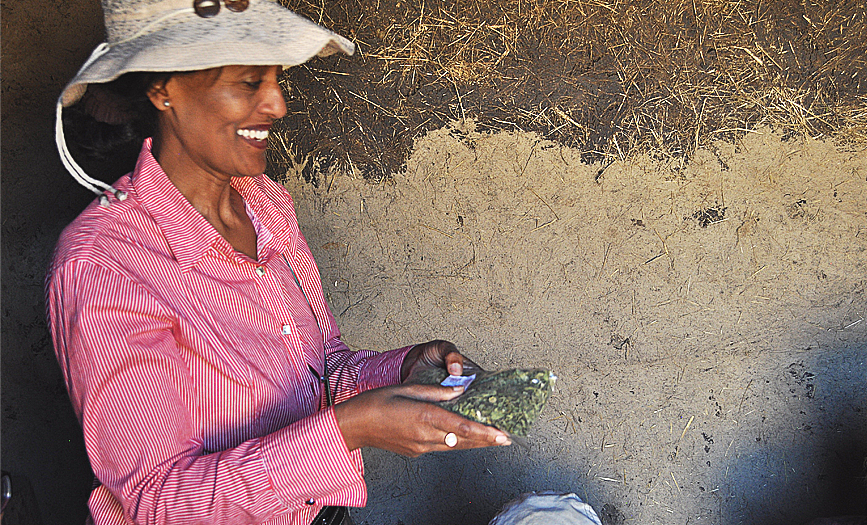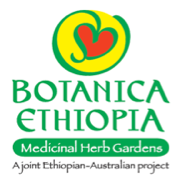On our previous trip to Ethiopia, we invited the owners of Ariti – a long-running herbal production company in Addis Ababa – to visit the Fiche medicinal garden.
Chemists Ermias Dagne and Tadelech Tadesse established Ariti almost 20 years ago, and today, run the business with their daughters Dina and Beza. Ermias is a professor of organic chemistry at Addis Ababa University and also director of the African Laboratory of Natural Products (ALNAP).
Their company is well-known in town for beautiful essential oils of frankincense, eucalyptus, cinnamon and lemongrass; natural lotions, herbal teas and tinctures for everything from cold and flu to radiant skin.
We hoped Ariti might be able to share some wisdom with the Etse Fewus Association about how to process their herbs – and that there could be potential for some kind of partnership into the future.
We were so pleased they were able to join us on an early morning drive out to Fiche.
After a tour of the garden – wild and dry outside of the rainy season, and peppered with tiny white African jasmine – we found ourselves sitting with the Etse Fewus members inside their thatched guardhouse for a tea tasting.
“When we make friends in Ethiopia, we always invite them in for coffee: ‘Nu buna tetu’,” Ermias told us.
“But I’m an unusual Ethiopian,” he said, taking a handful of chopped lemongrass to throw into a pot of water Shikerke had boiling on hot coals.
“I have a poster over my door which says: ‘Come in and drink herbal tea!’”
“I have enough in my garden to prepare it for everyone – But, mejemere, I always have to take the first sip – people are too suspicious!”
As we cradled our own warm cups, the guardhouse filled with fragrant lemongrass steam and the heady oils of crushed eucalyptus leaves, ceremoniously laid to cover the mud floor underfoot.
We were passed traditional dubbo (bread) with black cumin, honey from the garden and sugared popcorn as Ermias and Tadelech showed the Association more samples of various herbal teas, oils and lotions they’d brought with them from Addis.
Etse Fewus members told the story of their garden, of the local herbs and how they are used for common ailments in this region. And the women shared some of their own herbal tea recipes – combinations of wild thyme, dried garlic, tenadam, mint and damakase.
“People can be dismissive of traditional knowledge, and yet, we must listen to it,” said Ermias. “The locals know a lot of things we don’t know. To ignore the traditional observation of herbal medicine use like this is to ignore the evidence.”
Tadelech spoke about how to clean and dry herbs for market – and how to save and store valuable seeds.
And she and Ermias floated the idea of sourcing herbs from the group for their shops in Addis. While they have their own garden there, Ariti also work with small growers and cooperatives all over Ethiopia to gather the various plants and resins for their products.
The Etse Fewus garden is not big enough – and still too dependent on regular rainfall – to provide a large supply on its own. But Ermias and Tadelech suggested contracting the job to the wider community, who could grow herbs in their own gardens and source wild plants from the surrounding area.
“Careful wild-crafting is also a form of conservation”, said Ermias. “It’s a way to spread knowledge about those plants in the community and the value of them in their natural state. Otherwise, they will be taken out as weeds to make way for agriculture.”
Thyme, often used for respiratory problems and hypertension, is one such herb that grows happily on the rocky, exposed ledges of this highland region. Certain types of Aloe are also found high and wild in Fiche – as is Chikugn, used for eye infections and psychiatric conditions.
“They should consider, not only the land they have been given here, but all of this environment as their garden. It is all their land and they should involve the whole community in harvesting and caretaking.”
Small steps to market
Almost a year on, we had an appointment with Gule from Etse Fewus and Dina from Ariti at a busy café in Addis.
Gule had brought a bag full of chamomile flowers, the harvest from seeds Ariti had supplied for the group to cultivate five months prior. The flowers were fresh and fragrant, but the yield was small: Even though the seeds had grown well, livestock had eaten all the plants in the other members’ compounds, Gule told us.
“It is something; we can’t sell much of this, but it is a start and hopefully we can learn from it,” said Dina, adding that Ariti would be prepared to pay 50 birr/ kilo for the chamomile, much more than the going price for teff, Ethiopia’s staple grain, at about 30 birr.
Gule had also brought samples of kitkita, used against malaria, and branches of endod berries, a beautiful natural soap for washing and brightening clothes.
Ariti have plans to develop a line of endemic medicinal herbal products and they hope Etse Fewus can play a role in providing some of the raw herbs.
“We really want to support this group and hopefully we can work more with them in the future to promote these plants – but it will be step-by-step,” said Dina.
We hope, that with some business skills and permaculture training already under their belts, they will be able to make it happen.
Together with their herbal honey operation, Etse Fewus’ ability to nurture such a market for their medicinal plants will be critical for the future of the communal garden – and ultimately – the conservation of some of their most precious natural resources.












Great to see the collaboration between those from Etse Fewus and from Ariti!
There is so much to admire here; just brilliant all round… just have to keep an eye on those pesky livestock eating all the chamomile flowers 🙂
What a collaboration! I see these business grow like wild herb. We need to use our GOD given herbs and thier power to heal us now more that ever. May the spirit of the herbs oversee your project.